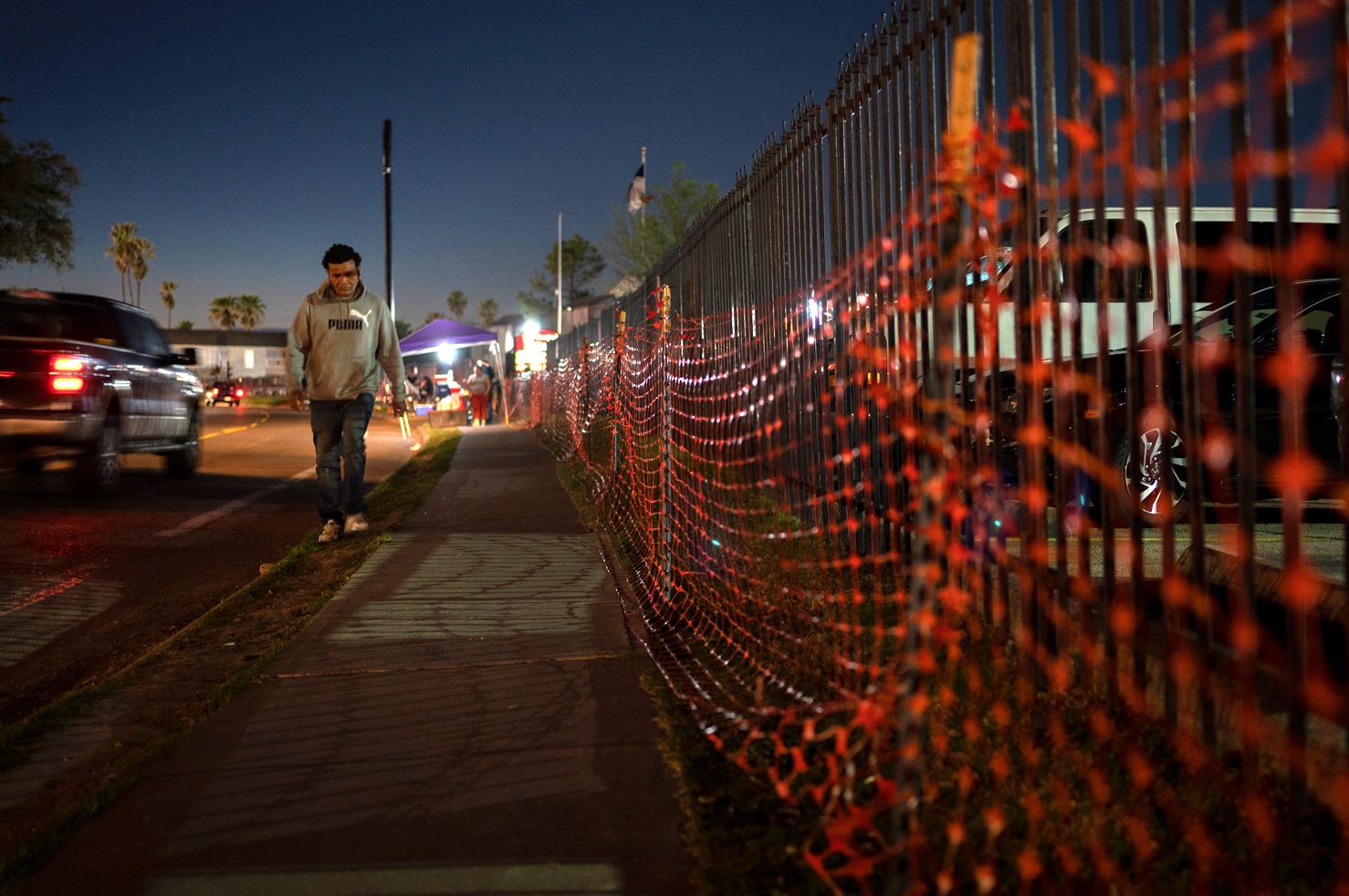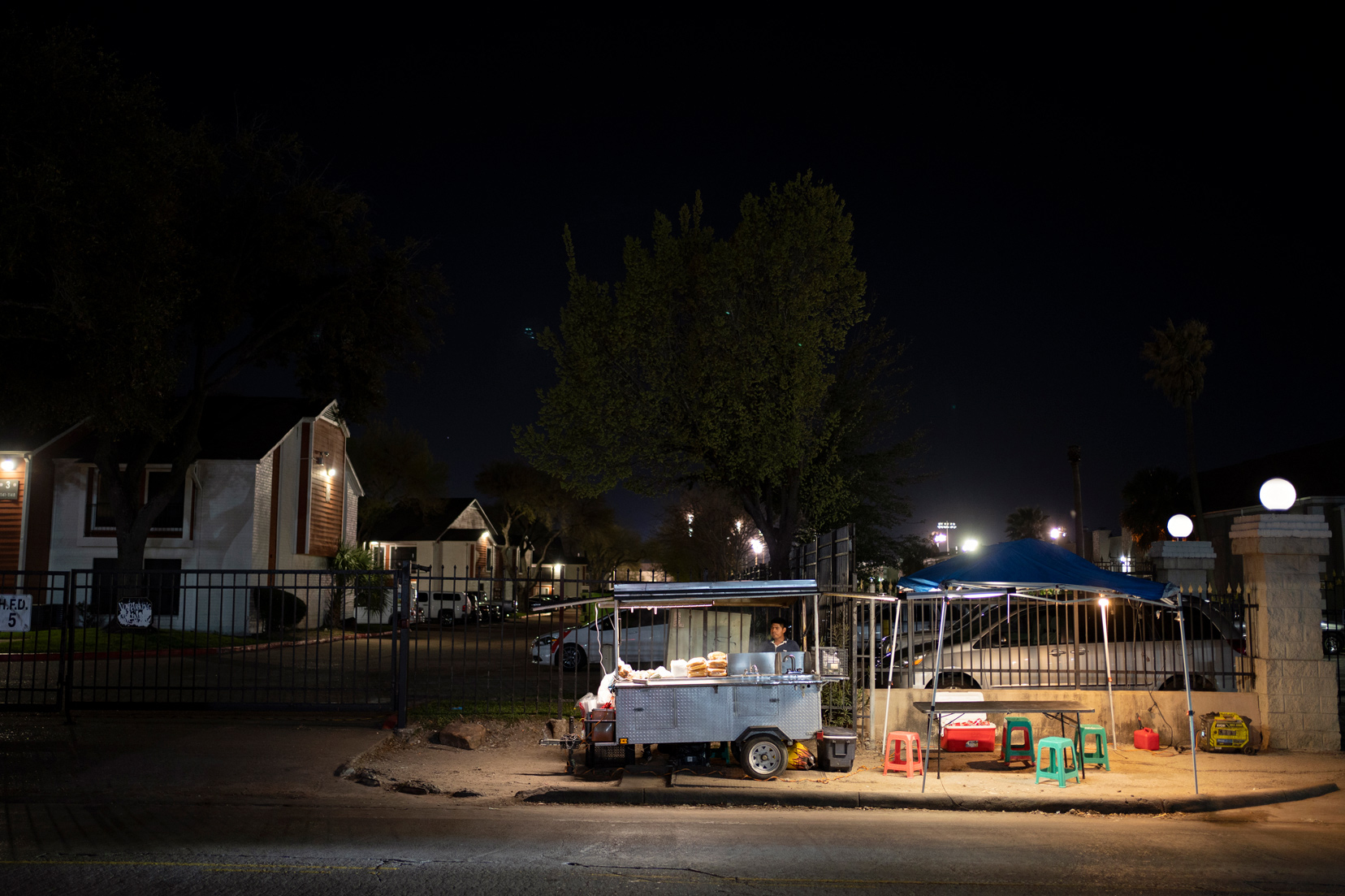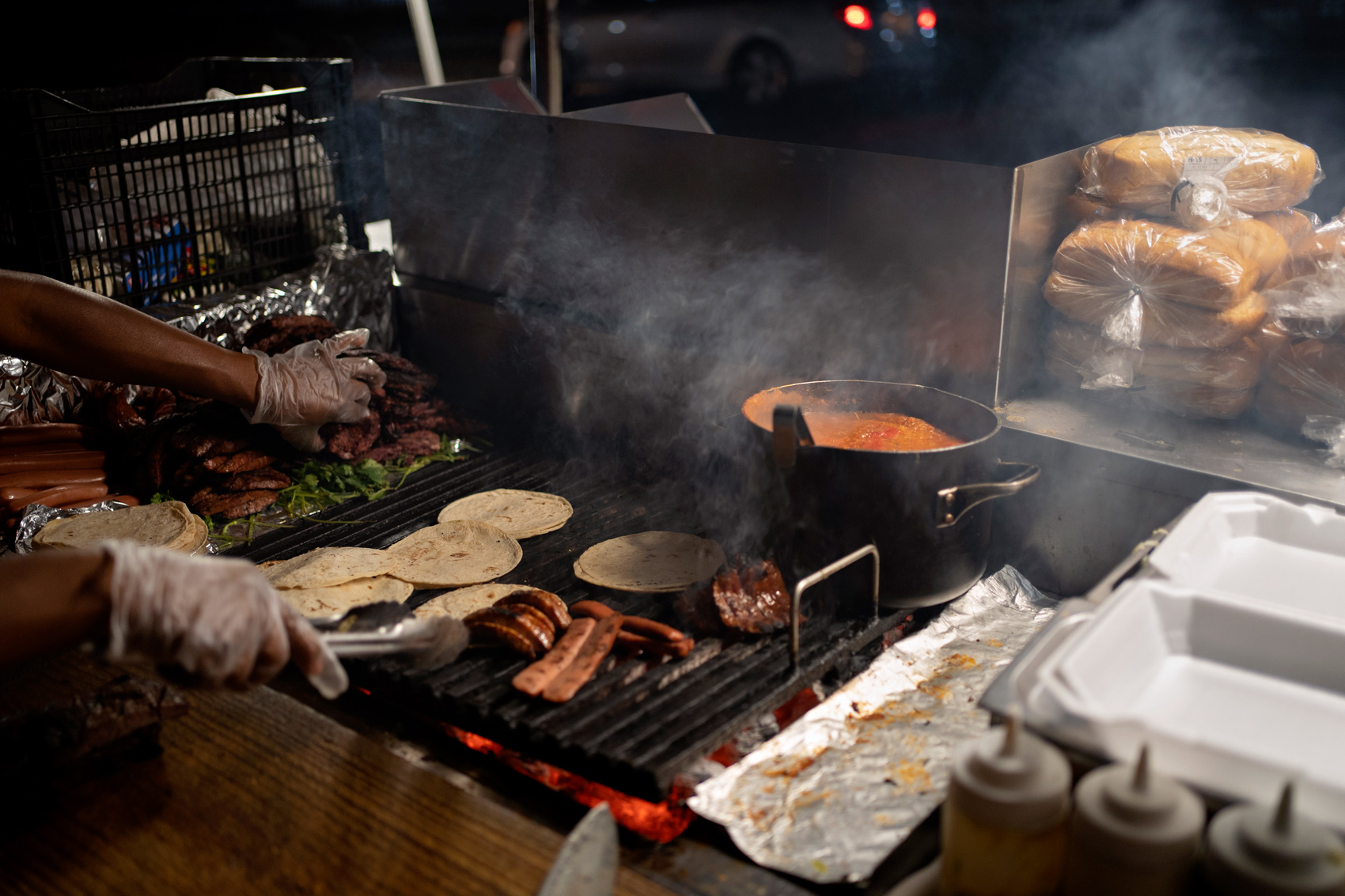|
Getting your Trinity Audio player ready...
|
It was a cold day in December when a police cruiser pulled up near Carla, a street food vendor who sells fried chicken on a bustling street in southwest Houston.
Carla only had seconds to think about how to react. As an officer exited the vehicle, she froze.
Carla, who asked not to be identified by her real name because of her immigration status, said she only recently had taken the job running the food stand after leaving a restaurant in downtown Houston to be closer to her 2-year-old son.
That day, the new job would cost her hundreds of dollars in the form of a ticket.
“The police told me that if I don’t give my full name, or if I gave a false name, he was going to take my fingerprints,” Carla said in Spanish.
A few hundred feet away, Maria had time to run and hide, but failed to turn off the portable skillet she uses to cook her pupusas. By the time the cops were gone, about 30 of them had burned.
Carla and Maria – who asked that their names not be used because they are in the country illegally – are from Guatemala and El Salvador. They have been in the United States for four and five years, respectively, and are single mothers.
Dozens of vendors just like them line the sidewalks on a three-lane street near Gessner Road on weekend nights selling cooked food, fruit, toys and clothing.
What they see as an attempt to make an honest living, however, has aggravated a nearby apartment complex owner concerned about traffic and parking issues, to the point that she is threatening to sue the city for failing to enforce its laws.
Houston police say they have tried both education and enforcement. With council members calling on the city for a solution, the neighborhood squabble is raising questions about how Houston can accommodate enterprising vendors and frustrated neighbors alike.
At a recent City Council meeting, Mayor John Whitmire said he is not interested in taking a heavy-handed approach.
“So many of them are desperate. This is their only income. So, we’ve got to be considerate,” Whitmire said.
Thriving market
Flanked by aging apartment complexes and strip malls, the street near Chinatown seems at first glance like an unlikely location for a market. Yet, almost every weekend night the area comes alive with the smells of fried chicken, pupusas and tacos.
One vendor sells ice cream out of a pushcart hand-painted to look like a city bus from a town called Joyabaj, in Guatemala. Farther down the road, another vendor on a recent Thursday afternoon was heating up vats of frying oil. A third was lining the sidewalk near a busy corner with used work boots, sneakers and pants.
Many of their customers used the street as a drive-through, getting purchases delivered to their car windows while slowing traffic behind them.
None of the vendors displayed the city permits that would make selling food or goods on the street legal.
For some residents, the makeshift market is a godsend when they are searching for a meal. Adam Oakes, who lives at an apartment complex across the street, said he is a fan of the hot salsa and the energy the vendors bring to the area.
“Only thing missing is a mariachi band,” Oakes said.
The vendors have received a less welcoming response from some area property owners, however, and disputes between the two sides sometimes have flared into open conflict.

One of the most outspoken critics is Shashi Singh, owner of a nearby apartment complex, who said she has been complaining to City Hall for 18 months. Singh said the vendors’ customers block access to her parking lot and take up visitor parking spaces, frustrating her and her tenants.
Singh said she is considering selling the complex or suing the city because she has seen little response to her concerns.
“Take them wherever you want to take them. But at least don’t block my entrance,” she said. “They’re taking over my street, where my entrance is. I had a fire in December, you know. If they are blocking my entrance, every minute counts.”
District F Councilmember Tiffany Thomas said at a Feb. 7 council meeting that she has urged the Houston police and health departments to mount an education and enforcement campaign in the area, funded by $10,000 from her district council fund for police overtime.
Lt. Jonathan Lui, who leads the differential response team for the Houston Police Department’s Westside Division, said their efforts started with trying to inform vendors about how to obtain the proper permits.
“We believe we educated the majority of vendors. We ultimately started enforcement,” he said. “Since then, we have issued 175 to 200 citations. A lot of vendors would explain that this was the cost of business, and many of them would pay the ticket.”
A city fine schedule lists a $394 fine for selling goods without a license and a $584 fine for failing to have a food dealer permit.
Enforcement continues on a weekly basis, Lui said.
Some council members are calling on the city to do more. District J Councilmember Edward Pollard, who has represented the area since a redistricting went into effect at the start of the year, said at the Feb. 7 meeting he wanted the city to craft a strategy for the police department.
The issue is not confined to a three-block stretch of one street, Pollard said, adding he increasingly is hearing about vendors setting up shop in southwest Houston in neighborhoods including Alief, Westwood, Gulfton, Westpark and Braeburn.
“We have to find a way to educate them on the proper way to get a permit and to sell items in an appropriate manner,” Pollard said. “But it brings down the quality of life and the aesthetics of the area. And It’s something that if we don't get in front of, we will start to see it popping up on more and more streets.”

Vendor frustration
While council members and police said they have emphasized education, a half-dozen vendors who spoke to the Landing said they were left feeling more intimidated than enlightened. The vendors said officers say what they are doing is illegal, but do not give them any information on how to find a legal avenue to sell their goods.
None of the vendors recalled visits by city officials or police officers that focused on providing information. The vendors – who said they came to this country from Latin American countries including Guatemala, El Salvador and México – say they feel targeted.
Carla said she did not even have time to think about giving a fake name when she received that ticket in December. She was in shock and hesitant to talk to the police officer who just kept repeating that what she was doing was illegal.
A week after receiving that first ticket, the same officer showed up again, she said, and walked directly to her to give her a second citation. She now is awaiting a court date for tickets totaling more than $1,000 and is being bombarded with mailers and calls from attorneys seeking to represent her.
“I know I’m doing something illegal,” Carla said. “But I’m not robbing anyone. I’m not hurting anyone.”
That was the general sentiment of most vendors, who acknowledged there are rules prohibiting what they do. With few other options to sustain their families, they say it is a risk they take out of need.
“We are trying to have an honest job,” Maria said. “The situation here (in the United States) is really hard. You think you will prosper when you come here, but it’s not easy, especially being a single mother.”

Role of street food
The dispute involving immigrant food vendors, property owners and police is far from unique to Houston, according to Sarah Fouts, a professor in American Studies at the University of Maryland Baltimore County who studies the practice.
Historically, street food, and the food industry in general, has provided a venue for people from impoverished backgrounds, immigrants and other vulnerable communities to get established in a new place, Fouts said.
Street vendors provide a valuable resource to residents of those communities, while earning a living.
“It’s an easy kind of entryway for new immigrants and people who aren’t documented,” she said. “And they are serving foods that are familiar and that are culturally relevant, and that are also filling, right? You need a big meal if you are going to work in roofing or doing whatever kind of physical labor that is required.”
The double vulnerability of being unlicensed and in the country illegally makes vendors easy prey in squabbles over public spaces, Fouts said.
Without legal documentation to reside in the United States, these vendors tend to shy away from providing the personal information needed to get a mobile food license, which in Houston can cost between $700 and $1,150 for new food trucks or carts.
Cities and states have tried different responses that range from cracking down to embracing the vendors. Those looking to expand legalization pathways argue the foods will be sold regardless, but they are met with those who say homemade food poses a greater health risk.
In 2023, a bipartisan bill in Arizona, dubbed the “Tamale Bill,” attempted to expand the list of homemade food items that can be sold on the street legally. Despite having wide bipartisan support, however, the bill faced opposition from the state’s Department of Health Services, which cited fears of an increase in foodborne illness, and it eventually was vetoed by Gov. Katie Hobbs.
As states and communities try to deal with street vendors, part of the conversation should include recognition of the role these vendors pay for the greater community that they inhabit, Fouts said.
“These folks are actually providing an important service to the community,” she said. “They wouldn’t be there selling food if they weren’t needed.”
A Houston solution?
Addressing City Council earlier this month, Whitmire said he hoped to craft a compromise that avoids a harsh crackdown.
“It’s really kind of exciting, but for the hardship it places on traffic and property owners. But the native food and clothing is something I want to show my grandkids, but we need to do it right,” he said.
Councilmember Thomas said she is optimistic about finding a solution that will satisfy all sides. She said she hopes the city can find a location to offer vendors – such as a parking lot – that will not block traffic.
“That’s better, and they can keep their community, they can keep their neighborhood,” Thomas said. “To me, that’s the only solution that’s on the table.”
Lui said such a solution would satisfy the police department, which is primarily concerned about vehicle and pedestrian safety. In the meantime, he is pursuing the idea of putting up physical barriers such as rocks or fences in the area frequented by the vendors.
Maria said she already has encountered physical barriers installed by a private party. An orange plastic fence keeps her and others from utilizing about two feet of grass that extend past the metal fence outside an apartment complex.
She is not opposed to the idea of moving to a parking lot, but hesitated when asked if she would be willing to apply for a permit to secure a spot. It is not that she does not want a permit, she said, but she does not understand the process and how it would accommodate those with her immigration status.
“Of course, I would feel better if I was to get some sort of permit,” Maria said. “I would live a little better, or maybe not better, but more at ease.”
Thomas said she also would like the city to help the vendors navigate the Health Department bureaucracy so they can obtain permits that will allow them to sell food legally.
Permisos para puestos de comida móviles
El Departamento de Salud de la ciudad de Houston tiene diferentes requerimientos para vendedores de comida ambulantes, o móviles, y aquellos con un establecimiento físico.
Las formas y documentos requeridos, al igual que el precio para conseguir su permiso, varían según el tipo de establecimiento que desee operar. Estos son algunos de los requerimientos para aquellos que buscan vender comida de un establecimiento móvil:
- Planos que establezcan el tamaño de la unidad, al igual que el diseño interior y exterior.
- El menú que desea servir.
- Certificación de manejador de alimentos.
- Un mapa del lugar donde su unidad se localizara y un acuerdo firmado y notariado con el dueño del lote o lugar.
- Si su negocio no tendrá un lugar fijo, deberá entregar una lista de lugares donde operará.
- Una inspección del interior y el exterior de la unidad tiene que ser programada antes de la apertura del establecimiento.
- Un recibo de comisaría estableciendo que tiene acceso a agua fresca antes de su inspección.
- El costo para obtener un permiso para una unidad móvil varía de $701.20 a $1148.69.
Para más información puede contactar al Departamento de Salud por correo electrónico a [email protected], o por teléfono al (832) 393-5100.
The Houston Health Department website has a 13-point checklist for applicants who want to obtain new mobile food unit permits, a 69-point checklist for food truck floor plans and a 24-page application packet. Some of those documents are provided only in English.
Thomas acknowledged the financial and logistical challenges vendors face.
“I do think for this population it would be a barrier. We would have to walk hand in hand,” Thomas said. “They’re not even first generation. They just got here. So, just the culture of being comfortable working with government, that’s a whole thing by itself.”


